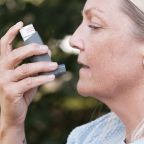
Don’t suffer effects of breast cancer alone
This October for breast cancer awareness month, Macmillan Cancer Support wants to raise awareness of the side effects faced by people living with or beyond the disease.
Breast cancer survival rates have been improving for 40 years. More women are surviving breast cancer than ever before, thanks to improvements in treatment and earlier diagnosis. In the 1970s around 5 out of 10 women with breast cancer survived the disease beyond five years. Now it is more than 8 out of 10.
Alison Authers, Lead nurse of the Macmillan Lymphoedema team at Royal Devon and Exeter NHS Foundation Trust says; “With many more people diagnosed with and surviving breast cancer, more and more are now living with the emotional and physical side effects of the disease and its treatment – some of which are not always expected or recognised.
“Most people have some side effects during and for a few weeks after treatment for breast cancer. Sometimes certain side effects may not go away. And, occasionally, people may develop side effects months, or even years, after treatment.
“These might include fatigue – this is probably the most common side effect of breast cancer treatment. It's a feeling of having no energy so it can be difficult to do even simple, everyday tasks. My team are set up to support people with Lymphoedema, which affects around one in five people after breast cancer treatment; it is a swelling usually of the limbs, and can be the result of surgery to remove or radiotherapy to the lymph nodes. It is a side effect that can occur during treatment or a long time afterwards.
“But it’s equally important to consider the emotional effects; people who’ve had treatment for primary breast cancer are often coping more with the psychological and emotional effects than physical ones. These effects can include worrying about whether the cancer might come back, dealing with changes in body image and general loss of confidence.
Alison continues; “The key message here is if you’re dealing with any of these side effects, you don’t have to face them alone. Talk to your GP, CNS or oncologist, go to your local information and support centre, or look for support online. Whether it’s linking up with a support group, taking part in specialist physical activity, asking for a referral to a counsellor, or even just accessing information, there is plenty of help and support available which could make a positive difference to your quality of life.”
No one should face cancer alone. If you have any worries or questions about breast cancer, visit www.macmillan.org.uk or call Macmillan free on 0808 808 00 00.

















